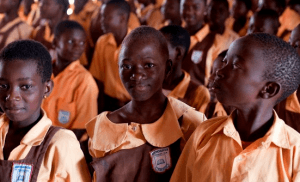It will take Ghana 100 years to meet global education commitment – UNESCO
 A new UNESCO report on education shows that it will take Ghana 100 years to meet its global education commitment.
A new UNESCO report on education shows that it will take Ghana 100 years to meet its global education commitment.
The Global Education Monitoring Report which shows the potential for education to propel progress towards all global goals outlined in the new 2030 Agenda for Sustainable Development (SDGs), also shows that education needs a major transformation to fulfill that potential and meet the current challenges facing humanity and the planet.
The SDG 4 says to ensure inclusive and quality education for all and promote lifelong learning.
Indicating that there is an urgent need for progress in education to speed up, the report notes that, on current trends, universal primary education in sub-Saharan Africa will be achieved in 2080; universal lower secondary completion in 2089; and universal upper secondary completion in 2099. This would leave the region 70 years late for the 2030 SDG deadline.
Ghana, the report says, is expected to reach universal primary education in 2065. The country will reach universal lower secondary education in 2085, and upper secondary education in the next century.
The Report also shows the need for education systems to step up attention to environmental concerns.
“While in the majority of countries, education is the best indicator of climate change awareness, half of countries’ curricula worldwide do not explicitly mention climate change in their content, including Ghana’s,” it says.
According to the report, despite, being one of the regions most affected by the effects of environmental change, sub-Saharan Africa has far fewer mentions of sustainable development in its curricula in comparison with Latin America, Europe and North America.
The report urges education systems to take care to protect minority cultures and their associated languages, which contain vital information about the functioning of ecosystems.
It however, shows that 40 per cent of the global population is taught in a language they don’t understand. Sub-Saharan African houses the most countries with the highest degree of linguistic diversity, it adds.
While the report argues that education systems must ensure that they are giving people vital skills and knowledge that can support the transition to greener industries, and find new solutions for environmental problems, pointing out that it also requires education to continue beyond the school walls, in communities and the workplace throughout adulthood, it indicates that only 7 per cent of adults in Ghana have ever attended literacy programmes.
Stating that education can reduce working poverty, the report shows that in Ghana, 40 per cent of those with primary education or less are in working poverty, compared to 28 per cent of those with lower secondary education, 26 per cent of those with upper secondary and 10 per cent of those with tertiary education.
By Emmanuel K. Dogbevi
Copyright © 2016 by Creative Imaginations Publicity
All rights reserved. This news item or any portion thereof may not be reproduced or used in any manner whatsoever without the express written permission of the publisher except for the use of brief quotations in reviews.
